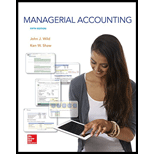
Managerial Accounting
5th Edition
ISBN: 9781259176494
Author: John J Wild, Ken Shaw Accounting Professor
Publisher: MCGRAW-HILL HIGHER EDUCATION
expand_more
expand_more
format_list_bulleted
Concept explainers
Question
Chapter B, Problem 4E
To determine
Present Value:
Present value of money means the present or current value of a future
Future Value:
The future value is the value of present cash flow at specified time period and at specified
We have to determine the rate of interest that should be earned.
Expert Solution & Answer
Want to see the full answer?
Check out a sample textbook solution
Students have asked these similar questions
Accounting
Savannah Construction reported beginning total assets of $1,100,000 and ending total assets of $1,200,000 for 2020. Its net income for this period was $520,000, and its net sales were $3,000,000. Compute the company's asset turnover for 2020.
Solve question
Knowledge Booster
Learn more about
Need a deep-dive on the concept behind this application? Look no further. Learn more about this topic, accounting and related others by exploring similar questions and additional content below.Similar questions
- Cher Industries has total material costs of $56,200, and total conversion costs are $74,600. The equivalent units of production are materials 18,250 and conversion costs 22,150. Compute the unit costs for materials and conversion costs.arrow_forwardHello expertarrow_forwardHow much are equivalent unit for materials if the FIFO method is used?arrow_forward
arrow_back_ios
SEE MORE QUESTIONS
arrow_forward_ios
Recommended textbooks for you
